CHAPTER 5
GUIDELINES FOR STRESS MANAGEMENT
The traditional approach in stress management is usually to teach relaxation techniques as opposed to stress = tension. Here we will have a different approach. The basic concepts relating to stress, of course, will remain the same.
First of all, let’s clarify that “stress” is not something new that only a few privileged people have to deal with. Stress is necessary for life and health. The only place on earth without stress is the cemetery. Before we get confused let’s look at some terminology.
Stressor – is the actual circumstance causing stress.
Eustress – is a “healthy” stress, that stimulates our body to action.
Distress – is the “bad” stress. In reality, as we will see later, the difference between good and bad stress depends on the reaction of each individual.
Basic Concepts
- In all our topics we found that our organism functions as a physical, mental, spiritual and social unity in harmony with the WHO definition of health as “the complete physical, mental, and social well-being and not merely the absence of disease or infirmity.” We also have seen that there are intimate relationships between the immune system, nutrition, exercise, rest, spiritual behavior, stress management, etc.
- According to Rene Dubos, good stress management equals health, and being overcome by stress leads to disease. We will find many similarities between stress management and the psycho-neuro-immune system.
- The Canadian physician Hans Selye coined the notion “general adaptation syndrome” in relation to stress. This is an important concept. We have to adapt ourselves constantly to a changing environment in all four areas: physical, mental, spiritual, and social. It can be temperature, light, sound, physical work, relationship to God and to other people, physical or emotional injury, etc. There can be variations in intensity and also combination of different “stressors”. The general adaptation syndrome implies that our organism reacts always in a similar way when confronted with an acute stressing situation, independent of the nature of that situation, be it physical, mental, spiritual, or social.
- There are minor and major stressors. They sum together. The higher the sum of stressors becomes, on a scale from 1 to 100, the more it affects our health.
- Stress is in essence, not the situation itself – although they are generally confounded –, but our response to it. Our response is modified by our perception, attitude, and previous experience. This means that we have at least some control over our responses to life events.
Physiological Effects of Stress on the Organism
The immediate physiological effects of an acute stress can be seen on the picture. They correspond to the phase of alarm of the general adaptation syndrome 1) Stages of the general adaptation syndrome: 1) Alarm, 2) Resistance, 3) Exhaustion. . We could say that such reactions are normal because these are the physiological mechanisms necessary to be ready to either “fight” or “flight”. In general, these effects disappear after the acute phase is over without leaving detrimental consequences behind. The problem arises when the stressor is: too strong, too long, or out of place.
Constant stress without necessary phase of recovery leads to the stage of exhaustion, which may result in several health problems, like peptic ulcers, hypertension, decreased libido, anorexia, depressed immune system, and finally depression. These are also called psycho-somatic diseases. Today we know that the mind and body affect each other in a much closer way than ever expected.
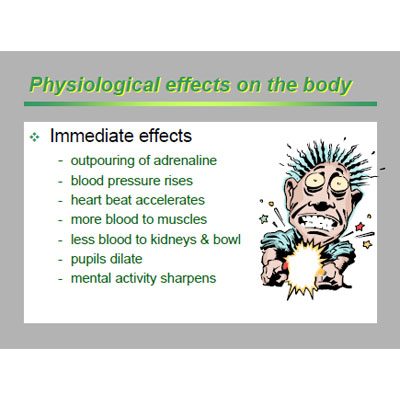
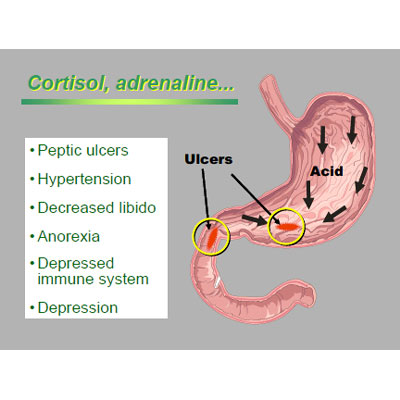
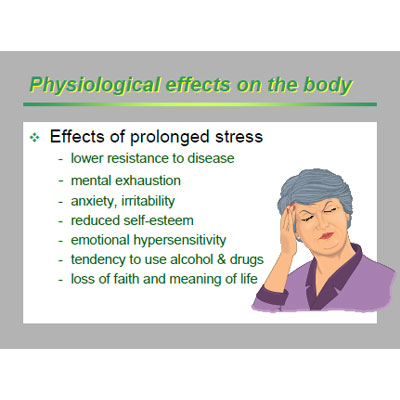
As we mentioned already, the causes of stress can be in any one of the four areas, physical, mental, spiritual, social, or a combination of these. Independent of the origin of the stress, all these areas will be affected because our organism functions as a unity. Some individuals may suffer more in the physical area while others perhaps will feel the consequences more in the emotional or social area, according to their individual peculiarities. There are great variations.
Infections and cancer are more frequent during the three years that follow major losses.
Why are some people more able to bear or to handle stress than others? More resistant individuals will respond with a less intensive reaction. These individual differences can be in either one or several of the four areas mentioned before. We can train ourselves to be able to support and manage heavier loads. This can be done through education and through a healthy lifestyle that strengthens our resistance and ability to cope, as we will see later.
Response to Stress
The 3 phases of response are:
- The stimulus or stressor. We cannot avoid all stressors but we can learn how to avoid some of them.
- Our conscious response depends in great measure on how we perceive or interpret the situation. Our perception varies according to our beliefs, education and previous experience. When a baby cries
at night, the father will probably perceive it as annoying while the mother may perceive it quite differently.

What about the man caressing a tarantula? Even if I knew that the spider would not bite me, I would feel quite nervous and prefer to stay away from it.
Different cultures and religions have different beliefs and sometimes supersti-cions that can greatly influence the behavior of their believers. By correcting wrong beliefs we may help to reduce stress. Many unnecessary fears, for example, are caused by a wrong image of God.
C. The initial alarm reaction depends on the autonomous nervous system and the endocrine system and is known as the “general adaptation syndrome”. We have not much influence on this mechanism except for our general physical and emotional health, which can be improved. We can also educate our conscious subsequent behavior to successfully cope with the situation, and this can make a big difference.

Inadequate Solutions
Under stressful situations some people lose “their head” and cause even more harm. It is easy to notice that such behavior does not help to solve the problem. It is therefore surprising how often people fall into such behavior without thinking. A good stress management requires training and repeated exercise in dealing with minor problems. You will be surprised to see how fast your capability to cope with stressful situations will grow or, at least, to bear with them.
Practical Applications
There are countless different stressful situations in life making it impossible to give specific unfailing recipes for each one of them. You will find innumerous books on the market about how to be successful in the school, in the job, in marriage, in human relations, etc. Nevertheless, most stressful situations can be grouped into a few categories and by following certain general principles lots of pain can be avoided, making life truly enjoyable and successful.
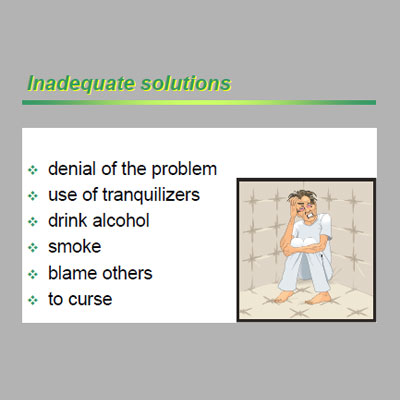

Time
In modern life where things get more and more accelerated, time management has become one of the most important matters. Many people start the day tired, late and unprepared. Their emotional tank is low. While dressing they listen to a few frightening news on the radio and then swallow a cup of coffee. No time for a nourishing breakfast nor for filling up the emotional tank from the all-power source from heaven! Then follow the many big and little duties of the day. And this pattern repeats day after day.

This arrangement must be changed drastically if you wish to survive in the long run. First, go to bed early – that means: no evening TV. The sleep before midnight is the most valuable. Some people say that they are owls and can’t change. Oh yes, you can change but it requires a few days and perseverance. Second, get up early. Getting up at five gives you plenty of time for physical exercise, a good breakfast and worship. You will feel overflowing of energy and ready to face the challenges to come.
Usually there are more things to do than would fit into the available time frame. Therefore successful people have learned to set priorities. There are things that are important and some are urgent. Some are both and some are neither important nor urgent. No matter how you arrange things, there will not be time for all. So start with the important and leave out unnecessary things, even if they may be pleasant and good. Make a plan, a written list. The best time to do this is the evening before and then revise it early in the morning. Learn to delegate – it is not easy! Start small, persevere, it is a life-long learning process.
Be diligent!
“Whatever you do, work at it with all your heart, as working for the Lord, not for men.” (Colossians 3:23; see also Ecclesiastes 9:10)
“Go to the ant, O sluggard; consider her ways, and be wise.” (Proverbs 6:6)
See also Proverbs 13:4; 20:4; 31:10-31.
“Our time belongs to God. Every moment is His, and we are under the most solemn obligation to improve it to His glory. Of no talent He has given will He require a more strict account than of our time….
“The value of time is beyond computation. Christ regarded every moment as precious, and it is thus that we should regard it. Life is too short to be trifled away…. We have no time to waste, no time to devote to selfish pleasure, no time for the indulgence of sin….
“We are admonished to redeem the time. But time squandered can never be recovered. We cannot call back even one moment. The only way in which we can redeem our time is by making the most of that which remains,…

“Life is too solemn to be absorbed in temporal and earthly matters, in a treadmill of care and anxiety for the things that are but an atom in comparison with the things of eternal interest….
“Upon the right improvement of our time depends our success in acquiring knowledge and mental culture. … A few moments here and a few there, that might be frittered away in aimless talk; the morning hours so often wasted in bed; the time spent in traveling on trams or railway cars, or waiting at the station; the moments of waiting for meals, waiting for those who are tardy in keeping an appointment – if a book were kept at hand, and these fragments of time were improved in study, reading, or careful thought, what might not be accomplished. A resolute purpose, persistent industry, and careful economy of time, will enable men to acquire knowledge and mental discipline which will qualify them for almost any position of influence and usefulness….
“It is the duty of every Christian to acquire habits of order, thoroughness, and dispatch. There is no excuse for slow bungling at work of any character. When one is always at work and the work is never done, it is because mind and heart are not put into the labor. The one who is slow and who works at a disadvantage should realize that these are faults to be corrected. He needs to exercise his mind in planning how to use the time so as to secure the best results. By tact and method, some will accomplish as much in five hours as others do in ten.” (Christ’s Object Lessons, chapter 25 – Talents: Time, p. 342-344)
Money
There is lots of poverty in this world. However, money cannot buy happiness. Many stresses and sufferings are caused by wrong distribution of available funds and for wanting more than we have.
Perhaps the most obvious and basic principle in money management is: Do not spend more than what you have. Of course, there are ways to finance a car or a house during several years, making it possible to buy necessary things you otherwise could not. But there are many, many things that are not really necessary and could wait. Just to mention some common things poor people spent money on, even lacking means for important things: Cigarettes, alcohol, cookies, soft drinks, radio, television, newspapers, fancy clothing, silly toys for their children, cinema, videos, popular music, etc.

One frequent cause of family fights and political trouble is because of divergent opinions about the use of money. The elaboration of a monthly budget would help many families to better distribute their scarce resources and to prevent funds slipping away through small holes. As much as possible, we should avoid making debts.
A basic principle that will help us to make correct decisions in regard to money is to recognize that everything belongs to God and we are only His stewards. “‘The silver is mine and the gold is mine,’ declares the LORD Almighty.” (Haggai 2:8)

God requires faithfulness in the administration of His means and promises rich blessings. “‘Bring the whole tithe into the storehouse, that there may be food in my house. Test me in this,’ says the LORD Almighty, ‘and see if I will not throw open the floodgates of heaven and pour out so much blessing that you will not have room enough for it.” (Malachi 3:10) Those who have been faithful in tithe and generosity can tell many wonderful experiences about the paradox mathematics that “less is more” with God’s blessings. Solomon witnessed God’s faithfulness when he looked back on his long life: “I was young and now I am old, yet I have never seen the righteous forsaken or their children begging bread.” (Psalms 37:25)
Here are some more counsels from Christ’s parables:
“Our money has not been given us that we might honor and glorify ourselves. As faithful stewards we are to use it for the honor and glory of God. Some think that only a portion of their means is the Lord’s. When they have set apart a portion for religious and charitable purposes, they regard the remainder as their own, to be used as they see fit. But in this they mistake. All we possess is the Lord’s, and we are accountable to Him for the use we make of it. In the use of every penny, it will be seen whether we love God supremely and our neighbor as ourselves….
“Money has great value, because it can do great good. In the hands of God’s children it is food for the hungry, drink for the thirsty, and clothing for the naked. It is a defense for the oppressed, and a means of help to the sick. But money is of no more value than sand, only as it is put to use in providing for the necessities of life, in blessing others, and advancing the cause of Christ….
“The more means we expend in display and self-indulgence, the less we can have to feed the hungry and clothe the naked. Every penny used unnecessarily deprives the spender of a precious opportunity of doing good.” (Christ’s Object Lessons, chapter 25 – Talents: Money, p. 351-352)


A smile is the most contagious thing in the world. Solomon said that “A cheerful heart is good medicine, but a crushed spirit dries up the bones.” (Proverbs 17:22)
Say “thank you” more often, even when it is not necessary! These two small words produce miracles and may change an entire critical situation. Everybody loves a thankful person. Again, Solomon in his wisdom states that “A gentle answer turns away wrath, but a harsh word stirs up anger.” (Proverbs 15:1)
The third one is not so easy to do; it requires a lot of practice and patience. To listen is more than just to be quiet until the other party finishes speaking. To listen requires active attention and empathy. By trying to putting yourself in the shoes of the other person you may understand her better and be merciful, even if you can’t agree. Whenever you disagree or need to rebuke somebody, cool down before you begin and try to
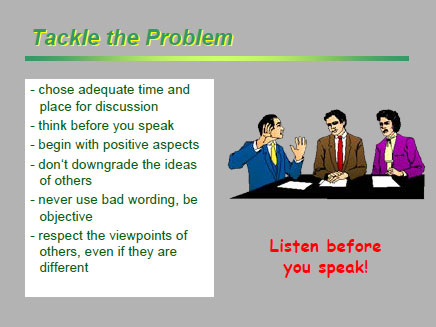
follow the rules of courtesy expressed in the accompanying picture. Don’t expect that everybody will agree with you even if you have the best arguments. But, as the apostle Peter said: “Do not repay evil with evil or insult with insult, but with blessing, because to this you were called so that you may inherit a blessing.” (1 Peter 3:9)
And the Apostle Paul adds, “If it is possible, as far as it depends on you, live at peace with everyone.” (Romans 12:18)
Disease
 Any disease, be it in the own flesh or of a beloved one, is always a cause of stress, especially chronic diseases or cancer. When the situation arises it is the domain of the treating physician to indicate the best way to proceed. In the context of stress management, however, we must say that it doesn’t help anyone to blame the sick person or anybody else for the condition. No matter what the situation may be, keep your faith in God and hold on to His promises. Jesus said, “Come to me, all you who are weary and burdened, and I will give you rest.” (Matthew 11:28)
Any disease, be it in the own flesh or of a beloved one, is always a cause of stress, especially chronic diseases or cancer. When the situation arises it is the domain of the treating physician to indicate the best way to proceed. In the context of stress management, however, we must say that it doesn’t help anyone to blame the sick person or anybody else for the condition. No matter what the situation may be, keep your faith in God and hold on to His promises. Jesus said, “Come to me, all you who are weary and burdened, and I will give you rest.” (Matthew 11:28)
Worries


How to Increase Our Resistance
Although most circumstances cannot be changed a great deal, we learned some specific things we can do to minimize and better handle the most common stressful situations. In this world we will never be totally stress-free. However, here is the good news: We can do a lot to improve our capacity to bear the hardships of life. A healthy lifestyle will provide physical, mental, and spiritual strength to adapt and cope with the daily challenges, including the social dimensions. In my experience, this is a most vital aspect for successful stress management.
Each one of the healthy habits listed on the picture is important by itself and should be implemented in the best possible way. You can see that this lifestyle affects each detail of life: sleeping patterns, activity, nutrition, friendships, and even your emotions and beliefs. There is no quick-fix for stress management.
By following these instructions the quality of life will greatly improve; the immune system will be strengthened; self-esteem will increase; family and working tensions will be handled more calmly; the stressors will appear smaller; sleep will be deeper; and with a clean conscience and trust in God you will face life with a positive and victorious attitude!
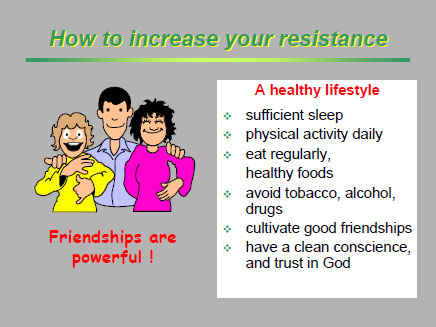
The “First Universal Stress Security Bank”

It is important to maintain your energy account always in a positive balance. Good, regular sleep and rest will restore the energies. Fresh air and a wholesome nutrition will supply energy to body and mind for the daily activities. Good friendships will lift you up when you are down and provide the extra moral (and sometimes material) support that you may need. A clean conscience is the best tranquilizer of the world. And finally, dealing with all challenges of life requires supernatural power and wisdom. God is the source of all power and He promised, “I am with you always, to the very end of the age.” (Matthew 28:20)

-o-O-o-
References
| ↑1 | Stages of the general adaptation syndrome: 1) Alarm, 2) Resistance, 3) Exhaustion. |
|---|
